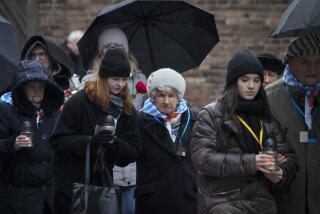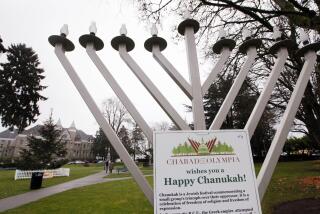Bar Mitzvah of American: Rare Event for Poles
- Share via
KRAKOW, Poland — Responding to a plea from Krakow’s tiny Jewish community, which had not celebrated a bar mitzvah in nearly a quarter-century, a 13-year-old American boy on Saturday marked Judaism’s rite of adulthood in a land where several generations of his forebears have lived.
And for many elderly Jews who attended, the bar mitzvah of Eric Strom, of Stamford, Conn., was the first they had witnessed in a synagogue since the city’s thriving Jewish community was devastated by the Nazis.
The last such event in Krakow occurred in the early 1960s, according to local Jewish officials, and there are no plans to hold another one.
Only About 200 Remain
Krakow’s Jews--who once made up a vibrant community of 60,000--now number only about 200. Only two synagogues, the Orthodox Remu and the Tempel, where Eric had his bar mitzvah, are still open. Before the war, Krakow had more than 300 synagogues.
“Here we have no children, no youth,” said Chana Fogel, 67, whose husband was the last cantor in Krakow until his death last year. “That’s why this was such a special and moving event for us.”
The boy’s trip was arranged by the Federation of Jewish Philanthropies in New York as a gesture of solidarity with Krakow’s Jews. Federation members visited the city in April and were told that the greatest gift they could give Krakow’s Jews would be to send an American boy here for his bar mitzvah and thus restore a sense of the continuity of Jewish tradition to the depleted congregation.
“(They) said bring us some life, some youth--bring us a bar mitzvah,” Eric’s rabbi in the United States, Emily Korzenik, explained.
“I hope this brings life to these people and lets them know we haven’t forgotten them,” said Eric, who attends the Greenwich Country Day School. “It’s probably the last bar mitzvah they’ll ever see, and that’s sad.”
Eric’s mother and father, Barry and Marjorie Strom, his younger sister, Holly, 9, and three of his four grandparents accompanied the boy on the trip. His great-grandparents were born in Poland near Krakow--a city of more than 700,000 people--and left for the United States before the war.
About 120,000 of about 3 million Polish Jews survived the Holocaust. Thus, a viable if severely reduced Jewish community existed in Poland until 1968, when an officially inspired campaign of anti-Semitism, brought on by a power struggle between competing Communist Party factions--resulted in thousands of Jews’ fleeing.
In giving Krakow its first bar mitzvah in years, the Stroms also brought controversy. There are about 100 women rabbis in the United States, a practice that many Orthodox Jews are not comfortable with--and there was outrage among them that a woman might officiate at Saturday’s ceremony.
Thus, in addition to Korzenik, a male Orthodox rabbi was sent by an American group, and both rabbis attempted to officiate. Rabbi Nahum Elbaum, the Orthodox cleric, led the ceremony and tried to prevent Korzenik from speaking.
While this was taking place on the platform, in a practice traditional in Orthodox synagogues, men prayed in the main synagogue while women worshiped separately in a balcony gallery.
“This woman has no right to speak in an Orthodox synagogue,” said Elbaum, breaking into English after leading prayers in Hebrew.
“This is not an Orthodox synagogue,” Korzenik replied.
Elbaum--who earlier snatched the tallis , or prayer shawl, from Korzenik--left the main chamber.
“Violence shall be no more in this land,” the American woman rabbi said. “The sun shall not go down and neither will the moon withdraw itself. We bring a message of hope with Eric that the life of Jewish people goes on in harmony.”
More to Read
Sign up for Essential California
The most important California stories and recommendations in your inbox every morning.
You may occasionally receive promotional content from the Los Angeles Times.













